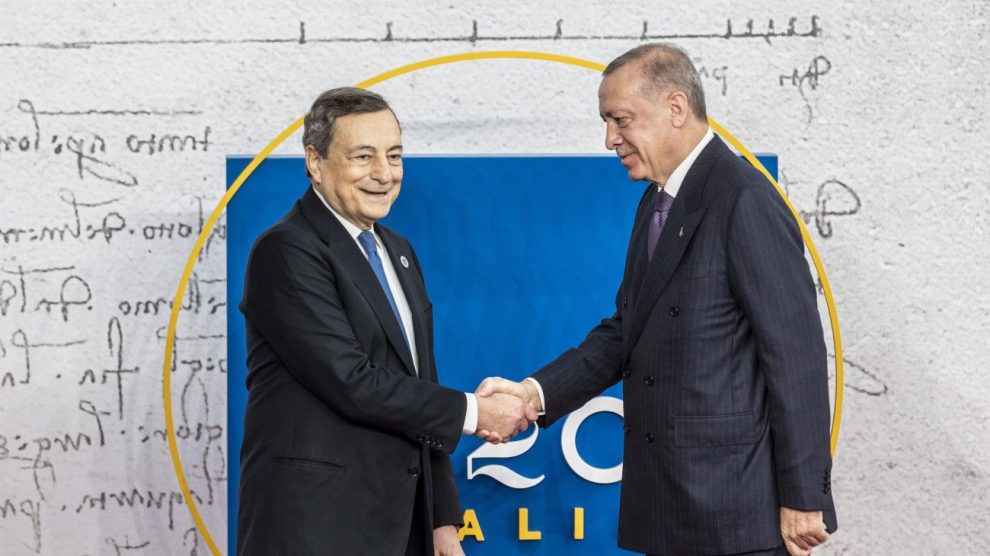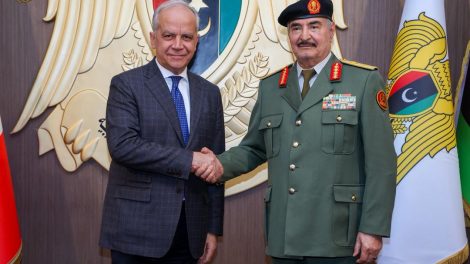The Ankara trip. During a speech to Parliament on Thursday, Prime Minister Mario Draghi announced he would be holding a summit with Turkish President Recep Tayyip Erdogan in July. They will discuss “the negotiation and diplomatic prospects of the conflict, and the strengthening of relations between Italy and Turkey.”
Ties are warming up. The upcoming summit would be the first trip of a sitting Italian PM to Turkey – the strongest possible hint that Italy is committed to levelling up its relationship with Turkey. This realignment has been ongoing for some time now:
- In April 2021, shortly after the “Sofagate” incident, Mr Draghi called Mr Erdogan a “dictator” which “we nonetheless must speak to,” sparking a diplomatic backlash from Ankara.
- In September, things got better: the two leaders spoke over the phone in what Mr Draghi’s office described as a “fruitful and friendly exchange of views”.
- The duo held a bilateral meeting in late March 2022 alongside the NATO summit.
Just last Wednesday, at the United Nations, Foreign Minister Luigi Di Maio met with his Turkish counterpart Mevlüt Çavuşoğlu to discuss:
- strengthening bilateral relations;
- Rome’s support to Ankara’s efforts to mediate between Russia and Ukraine;
- and global food security.
NATO matters. The Ankara meeting will be held immediately after the NATO Summit in Madrid, where the next Strategic Compass – detailing the Alliance’s holistic approach and objectives over the next years – will be unveiled.
- Turkey is the only country blocking negotiations over Finland and Sweden’s NATO application, which would otherwise be done and dealt with in weeks – before the Madrid summit.
- Ankara accuses the two Nordic countries of hosting Kurdish dissidents and refusing to extradite them.
- However, analysts believe it’s a negotiation tactic – perhaps geared at unlocking the F-16 fighter jet consignment the US Congress is holding off.
- PM Draghi expressed Italy’s full support for Helsinki and Sweden’s accession as he welcomed Finnish PM Sanna Marin in Rome. He’s also in favour of boosting the EU’s defence capabilities to bolster NATO’s prowess. Depending on the developments in the coming weeks, he might use his leverage to those ends.
The Libyan connection. Both Italy and Turkey have sizeable stakes and interests in the war-torn and politically unstable country. And a joint approach could influence
- As he told US President Biden, Mr Draghi intends to work to stabilise the country. Libyan stability would help regional and energy security, with positive ripple effects on Italy, which is also looking to invest in the country.
- Mr Erdogan, too, seeks stability and the maintenance of the strong ties between Ankara and Tripoli. His government supports Fathi Bashagha, elected by the House of Representatives to succeed Abdul Hamid Dbeibah (who is not willing to cede power despite his term’s expiration).
- Turkey wields an immense influence over Libyan affairs. And although left mostly unsaid, the US appreciated Ankara’s intervention in 2019, which ended General Khalifa Haftar’s aggression and created the conditions for the 2020 ceasefire.
Finally, the economic ties between Italy and Turkey are rather strong. And both countries seem keen to bolster them.
- Italy is Turkey’s fifth-biggest trade partner in the world and the second-biggest in the EU. Pre-pandemic trade between them amounted to €18 billion (€15 billion in 2020, according to Istat).
- Turkish direct investments in Italy have been increasing (€523 million in 2018, latest available data) as Rome is a comfortable gateway for the European single market.
- Over 1.500 Italian companies operate in Turkey, including big-name industries.





